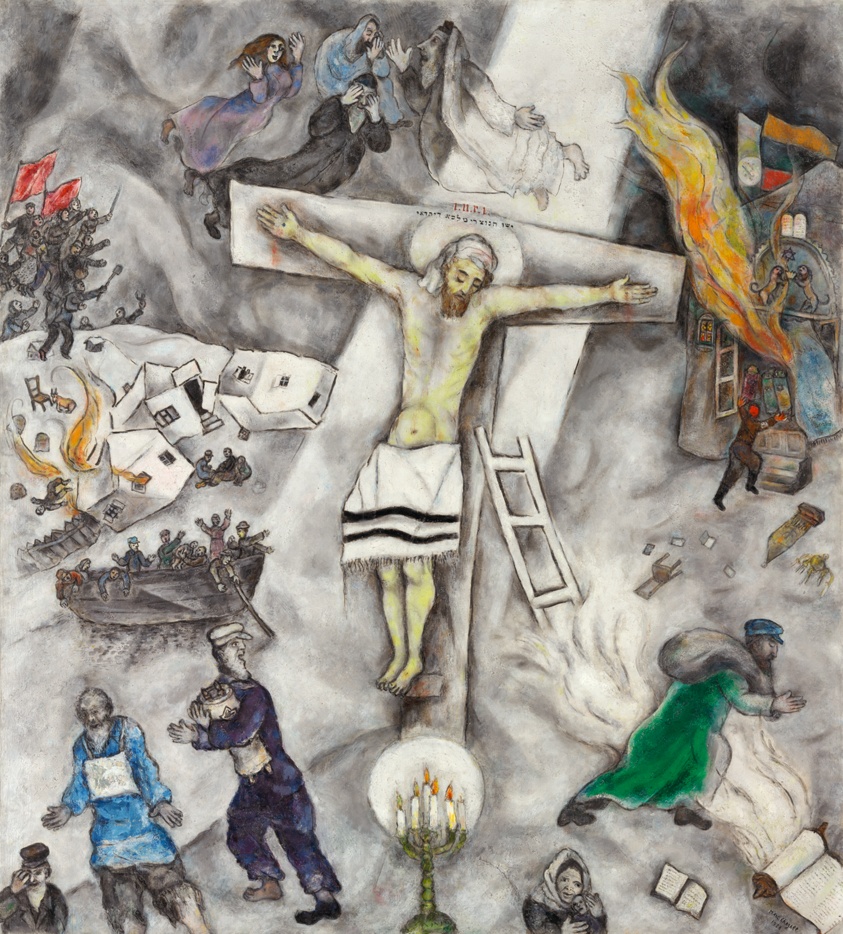
White Crucifixion, 1938. Chagall, Marc.
Friday, Week I.
Wednesday, Week II.
Monday, Week III.
Friday, Week III.
Students come to know my personal favorite scripture readings from lauds as we work our way through the psalter. The citations above are likely unintelligible to millions of people. But to those of us here at Seven Hearths Lane, when we start our day participating in the universal prayer of the Church, these citations become a common memory. Eventually we come to know what reading is coming, and then we connect that in some way to the life we have together.
For as long as I have been praying lauds with our junior high and high school students, every time a teacher recites these readings, I become a little weak in the knees. Why is that? Because they are difficult words to follow.
“Never let evil talk pass your lips; say only the good things men need to hear, things that will really help them.” (Ephesians 4:29)
“Who will separate us from the love of Christ?” (Romans 8:35)
“So it is with the faith that does nothing in practice. It is thoroughly lifeless.” (James 2:17)
“My grace is enough for you, for in weakness power reaches perfection.” (2 Corinthians:9)
Recently I finished reading a splendid little book written by a dear friend Andrew Zwerneman entitled, “The Life We Have Together: A Case for Humane Studies, A Vision for Renewal.” I plan on sharing his insights and wisdom with everyone for a few newsletters.
The author sets the stage for the vision by noting the current cultural predicament we all experience and the role of educational institutions in providing a solution:
“Americans find it increasingly difficult today to love the life we have together. To make matters more difficult, many have lost confidence in our Western culture, which once afforded them a vision of society as an intrinsic good. Since our academies play a central role in the preservation of culture, the strained bonds and lost confidence have hit teachers, their students, and the students’ families especially hard. At the same time, the division that burdens them has radiated out to every sector of society and has mounted to the point where we recognize it as a national crisis.”
What is more challenging? The words of Scripture or the divisions that beset our society.
My proposition is that our challenge remains the same as it ever was. How do we love the life we have together?
The solution is a vision steeped in shared memory, in a sense, the imparting of culture. Here is how Zwerneman defines culture:
“The record of what we know and love; the sympathies, purposes, and habits that free us to live our lives together. There are two chief normative sources in Western culture: philosophy, or the love of wisdom, which gives us our habits of learning, and revelation which gives us our habits of loving God and neighbor. The two sources converged in Rome where the West first fully emerged; thus, the West is derivate. Because of its emphasis on transcendent love, the West is inherently open to all persons and to all cultures. Westerners, like all humans, sometimes fail to love. Yet, despite the fluctuations of free will, transcendent love is permanently our highest and most enduring cultural standard.”
Memory possesses a timeless quality insofar as there is no limit to our capacity to remember and hope for a future not yet known. Zwerneman cites Augustine in this explanation of memory:
“... the capacity for seeing the whole of human life lies interiorly, in the memory. As Augustine teaches, the memory is of ‘infinite recess’ — infinite in that all that is collected in the memory is known and loved beyond the moments in which they were first experienced.”
As I was reading these words the image of standing in the gymnasium with over 100 students and 12 colleagues to pray lauds painted itself into my intellect. It is a memory that renews each day wherein we are immersed in a tradition that connects us to salvation history.
To tie this altogether, I will let Mr. Zwerneman make his case for the vision we embrace in our school’s mission:
“Givers of life remind us that no one person can live without being carried by someone else. All of our lives are relational. We are who we carry and how we respond to them. As individuals, all of our days are measured by how we give ourselves. As members of society, all of our existence is measurable by the record of life-giving, collected in memory as history, and practiced as culture.”
The next question becomes, “What is the purpose of this vision?” The answer may or may not surprise us and I certainly will not withhold it. Freedom is the goal, hence liberal education. More on that in about four weeks! - Mr. Derek Tremblay, Headmaster

